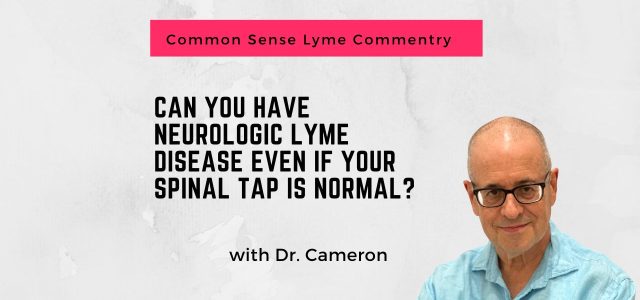
When Normal Test Results Hide Active Disease
Neurologic Lyme disease spinal tap results are often normal even when patients have active nervous system infection. A landmark 1990 study of 27 chronic neurologic Lyme patients found only 2 had cerebrospinal fluid findings suggestive of Lyme disease — yet the majority improved significantly with IV antibiotics. This reveals a critical problem: requiring “proof” via spinal tap to diagnose or treat neurologic Lyme disease delays care and worsens outcomes when CSF testing lacks sensitivity, especially in chronic cases.
When a Patient Hears “Spinal Tap,” They Often Ask:
“Do I really need one just to check for Lyme disease?”
It’s a reasonable question. A spinal tap—more formally, a lumbar puncture—is invasive, uncomfortable, and not without risks. But the conversation around spinal taps and Lyme disease is often oversimplified.
So today, let’s unpack the science and the clinical reality—in the form of a conversation.
A Clinical Dialogue on Spinal Taps for Lyme Disease
Cameron: I had a patient the other day who asked, “Do I really need a spinal tap to know if I have Lyme?”
Colleague: That’s becoming a common question. Especially when patients show neurological symptoms.
Cameron: Right. But spinal taps aren’t required in every case of neurologic Lyme.
Colleague: The CDC recommends one if there’s suspicion of meningitis, encephalitis, or radiculopathy.
Cameron: True. But not every neurologic Lyme patient presents that way. Take the Logigian et al. study from 1990. They followed 27 patients with chronic neurologic Lyme—brain fog, pain, paresthesias, memory problems—that had gone on for more than six months.
Colleague: Did their spinal taps confirm the diagnosis?
Cameron: That’s the key point. Only 2 of the 27 patients had CSF findings suggestive of Lyme—one had pleocytosis (elevated white cells), and another had intrathecal antibody production. But no one had both, which is what’s typically required to meet the strict definition of neuroborreliosis.
Colleague: So most of them had normal or non-specific CSF?
Cameron: Exactly. And yet—most of them improved significantly with intravenous ceftriaxone.
Colleague: So the CSF test missed it?
Cameron: It shows that CSF testing often lacks sensitivity, especially in chronic cases. We can’t rely on it alone to make or rule out the diagnosis.
Colleague: That’s concerning. I’ve seen patients dismissed after a “normal” spinal tap.
Cameron: Me too. That’s why I don’t treat spinal taps as a gatekeeper. If the clinical picture fits, I treat. A negative spinal tap doesn’t mean the disease isn’t real.
What the Logigian 1990 Study Found
In this landmark study of 27 patients with chronic neurologic Lyme disease:
All had chronic symptoms lasting more than 6 months. All had positive Lyme serology (ELISA), and most had confirmatory Western blot. Only 1 patient had pleocytosis, and only 1 had intrathecal antibody production—but no patient had both, which is typically required for a definitive diagnosis of neuroborreliosis. Despite this, the majority improved significantly after 2–4 weeks of IV ceftriaxone, especially in cognition, pain, and paresthesia.
Takeaway: Even without textbook spinal tap results, patients had active, treatable Lyme affecting the nervous system.
Why CSF Testing Lacks Sensitivity
Cerebrospinal fluid analysis looks for two key markers of neuroborreliosis:
Pleocytosis – Elevated white blood cells in CSF (typically >5 cells/μL). Intrathecal antibody production – Borrelia-specific antibodies produced within the central nervous system (not just blood contamination).
The strict European definition of neuroborreliosis requires both findings plus clinical symptoms. But the Logigian study showed this definition misses most chronic neurologic Lyme cases.
Why does CSF testing fail?
Timing: In chronic disease (>6 months), inflammation may have subsided even as neurologic symptoms persist. Compartmentalization: Spirochetes may affect peripheral nerves or specific brain regions without causing diffuse CSF abnormalities. Immune evasion: Borrelia can hide in tissues, minimizing immune response detectable in CSF. Test sensitivity: Current CSF antibody assays may not detect all Lyme-specific antibodies.
The result: patients with neurologic Lyme disease have “normal” spinal taps.
Why Clinical Judgment Still Matters
Neurologic Lyme can present without classic spinal tap findings. CSF testing has low sensitivity, especially in chronic cases. Requiring “proof” via CSF can delay diagnosis and worsen outcomes. Empirical treatment is sometimes the only way forward in real-world care.
That’s why I don’t let a “normal” spinal tap override the full clinical picture.
What I Do Instead in My Practice
Here’s how I handle neurologic Lyme symptoms in my clinic:
I use spinal taps selectively, not reflexively. I don’t rule out Lyme based on a “normal” spinal tap. I treat empirically when the exposure and symptom pattern fit. I consider co-infections and autonomic dysfunction in neurologic cases. I follow up closely to assess treatment response and adjust as needed.
Clinical response to treatment often provides more diagnostic certainty than any single test result.
When Spinal Taps Are Indicated
I’m not saying spinal taps have no role. They’re valuable when:
Meningitis suspected: Severe headache, neck stiffness, fever, altered mental status. Encephalitis suspected: Confusion, seizures, focal neurologic deficits. Ruling out other causes: Need to exclude bacterial meningitis, viral encephalitis, or malignancy. Confirming diagnosis: When positive CSF supports treatment decisions or satisfies insurance requirements. Baseline for monitoring: Documenting CSF abnormalities before treatment.
But when a patient has brain fog, fatigue, cognitive dysfunction, and peripheral neuropathy — classic chronic neurologic Lyme — a spinal tap often adds little diagnostic value.
The Medical Abandonment Risk
The most dangerous scenario is when doctors use “normal” spinal tap results to deny care.
I see this pattern regularly:
Patient has neurologic symptoms (memory problems, neuropathy, cognitive dysfunction). Lyme serology is positive or equivocal. Spinal tap is performed. CSF is “normal” (no pleocytosis, no intrathecal antibodies). Doctor concludes: “It’s not Lyme disease”. Patient is abandoned without further investigation or treatment.
This violates the principle that clinical diagnosis trumps laboratory testing when tests lack sensitivity. The Logigian study proved 25 out of 27 patients would have been denied treatment using strict CSF criteria — yet most improved with antibiotics.
This is medical abandonment disguised as evidence-based medicine.
Frequently Asked Questions
Do I need a spinal tap to diagnose neurologic Lyme disease?
Not always. While spinal taps can confirm neuroborreliosis, the Logigian study showed 25 of 27 chronic neurologic Lyme patients had normal or non-diagnostic CSF findings. Clinical diagnosis based on symptoms, serology, and exposure history is often sufficient.
Can you have neurologic Lyme with a normal spinal tap?
Yes. CSF testing has low sensitivity, especially in chronic neurologic Lyme disease. Most patients in the Logigian study had normal CSF yet improved significantly with IV antibiotics, proving they had active nervous system infection despite normal spinal tap results.
What does a positive spinal tap for Lyme show?
Classic neuroborreliosis shows pleocytosis (elevated white blood cells in CSF) and intrathecal Borrelia-specific antibody production. But many neurologic Lyme patients have neither finding, particularly in chronic cases lasting more than 6 months.
Why do chronic Lyme patients have normal CSF?
In chronic neurologic Lyme (>6 months), acute inflammation may have resolved even as spirochetes persist in nervous system tissues. CSF testing detects inflammation and antibodies, not spirochetes directly, so chronic low-level infection can produce normal CSF results.
Can I be treated for neurologic Lyme without a spinal tap?
Yes. When clinical presentation, serology, and exposure history suggest neurologic Lyme disease, empiric treatment is appropriate even without spinal tap confirmation. Clinical response to treatment often provides more diagnostic certainty than CSF testing.
Clinical Takeaway
The Logigian 1990 study fundamentally changed how clinicians should approach neurologic Lyme disease. Twenty-seven patients with chronic neurologic symptoms, all with positive Lyme serology, received IV ceftriaxone for 2-4 weeks. The CSF findings were striking in their absence. Only 1 patient had pleocytosis. Only 1 had intrathecal antibody production. None had both. By European criteria, none of these patients had definitive neuroborreliosis. Yet they had chronic, debilitating neurologic symptoms that responded to antibiotic treatment. This creates a diagnostic paradox: if we require classic CSF findings to diagnose neurologic Lyme, we’ll miss most chronic cases. But strict reliance on spinal tap results abandons patients with treatable disease. The study showed patients improved in cognition, pain, and paresthesias after IV ceftriaxone. This wasn’t placebo — these were objective measures of neurologic function. The improvement validated that they had active, treatable infection affecting the nervous system, regardless of CSF findings. The most harmful outcome is using “normal” spinal tap results to deny care. When a patient has suggestive symptoms (brain fog, cognitive dysfunction, memory problems, peripheral neuropathy, chronic pain, paresthesias), positive or equivocal serology, and appropriate exposure history, empiric treatment is appropriate. Clinical response to treatment provides more diagnostic certainty than CSF testing. This approach requires close follow-up and honest communication with patients about diagnostic uncertainty. But it prevents abandoning patients with treatable neurologic Lyme disease because their spinal tap was “normal.” Twenty-five of 27 patients would have been denied treatment using strict CSF criteria — yet most improved with antibiotics. That single fact should reshape how we approach neurologic Lyme diagnosis.
Related Reading
- Lyme Disease Testing and Diagnosis
- Understanding Lyme Disease Test Accuracy
- Spinal Tap Leak and Lyme Disease: When Symptoms Worsen After Testing
- Spinal Taps for Lyme Disease: Do You Really Need One?
- Brain Fog Lyme Disease: When Thinking Becomes Exhausting
- Lyme Disease Neuropathy: Symptoms and What Causes It
- Lyme Disease Pain: Why It Moves and What Helps
- Lyme Disease Fatigue: Why Rest Doesn’t Help
References
- Logigian EL, Kaplan RF, Steere AC. Chronic neurologic manifestations of Lyme disease. N Engl J Med. 1990;323(21):1438-1444.



Dear Dr. Cameron,
I am most impressed by your skill as a diagnostician and the ability to consider a broad perspective of deciding on the course of treatment. I have done extensive reading on Lyme disease and can say, without reservation, that, in my opinion, your knowledge and abilities as a healer are unsurpassed. I have viewed most of your videos and curse the fact that not only do I live a considerable distance from where you practice, in another country (Canada) no less.
I am most disappointed and discouraged with the treatment I have received in Canada. The Canadian Medical System has some serious flaws in that a patient is assigned a “family Doctor” which he cannot change except under extraordinary circumstances. It results in Doctors who become lazy in their thinking and anything new or unusual in the area of etiology is ignored or dismissed.
My case in point. I have had several tick bites and up[on requesting advice was given the standard Lyme test which I have discovered has less than a 50% chance of being right. Hence, I walked around with the disease for years. When my symptoms became severe, e.g., extreme back and neck pain I was diagnosed with Polymyalgia and was treated with high doses of Prednisone: as high as 50mg per day. Not only did the pains not go away but became worse and other neurological symptoms developed. The nerves in the left side of my body as well as my gut were seriously damaged and to this day have problems in that area. Other than a single course of Doxycycline and Ceftriaxone I have received no other treatment. The medical board in the Province in which I reside, Nova Scotia, considers additional treatment unnecessary.
Perhaps it would be possible to procure additional antibiotics and other medications but not having medical training or expertise have, for now, decided against this ploy. My present situation does not allow me to seek help in the United States but if it does become possible in the near future you can be sure that you are first on my list of contacts. I am most grateful for all your outstanding advice and encouragement and hope to shake hands with you at some point.
Most Respectfully,
Pieter Gerlach (pi*********@***il.com)
I have patients in the US with similar frustrations. All the best
My husband has been diagnosed with Bulbar Palsy, a neurological disease, but we live in tick country, the North Fork of Long Island. I would very much like to know if there is any possibility that Bulbar Palsy might be a caused by a tick bite?
Bulbar Palsy is typically seen as an Motor Neuron Disease (MND) / ALS manifestations. There are rare cases where Lyme disease has been considered ie. https://pubmed.ncbi.nlm.nih.gov/24397499/ Dr. Martz from Colorado bulbar palsy resolved with treatment for Lyme
I’m truly grateful to http://www.earthcureherbalclinic.com for helping me and my father manage motor neuron disease and Parkinson’s disease. Their herbal treatment made a real difference, we both saw major improvements without any side effects. The care and support we received were outstanding. I highly recommend Earth Cure Herbal Clinic to anyone looking for a natural and effective approach to healings.